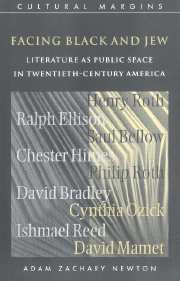Book contents
- Frontmatter
- Contents
- Preface
- Acknowledgments
- Introduction
- 1 “An antiphonal game” and beyond: facing Ralph Ellison and Henry Roth
- 2 “Jew me sue me don't you black or white me”: The (ethical) politics of recognition in Chester Himes and Saul Bellow
- 3 “Words generally spoil things” and “Giving a man final say”: facing history in David Bradley and Philip Roth
- 4 Literaturized Blacks and Jews; or, Golems and Tar babies: reality and its shadows in John Edgar Wideman and Bernard Malamud
- 5 Black–Jewish inflations: face(off) in David Mamet's Homicide and the O. J. Simpson trial
- Postface: Déjà-vu all over again; or, mirrors and the face – Anna Deavere Smith after Levinas
- Notes
- Bibliography
- Index
3 - “Words generally spoil things” and “Giving a man final say”: facing history in David Bradley and Philip Roth
Published online by Cambridge University Press: 22 September 2009
- Frontmatter
- Contents
- Preface
- Acknowledgments
- Introduction
- 1 “An antiphonal game” and beyond: facing Ralph Ellison and Henry Roth
- 2 “Jew me sue me don't you black or white me”: The (ethical) politics of recognition in Chester Himes and Saul Bellow
- 3 “Words generally spoil things” and “Giving a man final say”: facing history in David Bradley and Philip Roth
- 4 Literaturized Blacks and Jews; or, Golems and Tar babies: reality and its shadows in John Edgar Wideman and Bernard Malamud
- 5 Black–Jewish inflations: face(off) in David Mamet's Homicide and the O. J. Simpson trial
- Postface: Déjà-vu all over again; or, mirrors and the face – Anna Deavere Smith after Levinas
- Notes
- Bibliography
- Index
Summary
He wonders also about himself – that he cannot learn to forget, but hangs on to the past: however far or fast he runs, that chain runs with him. It is a matter for wonder: the moment that is here and gone, that was nothing before and nothing after, returns like a specter to trouble the quiet of a later moment.
Friedrich Nietzsche, The Use and Abuse of HistorySubmitting history as a whole to judgment, exterior to the very wars that mark its end restores to each instant its full signification in that very instant; all causes are ready to be heard. It is not the last judgment that is decisive, but the judgment of all the instants in time, when the living are judged.
Emmanuel Levinas, Totality and InfinityQuestion: when does an “incident” coincide with an “operation?”
Answer: when a free and unreconstructed event in human experience gets smuggled and/or indentured into plot. Differently put, History entails Reconstruction, as Reconstruction, in some part at least, requires Fabulation.
- Type
- Chapter
- Information
- Facing Black and JewLiterature as Public Space in Twentieth-Century America, pp. 81 - 110Publisher: Cambridge University PressPrint publication year: 1999

